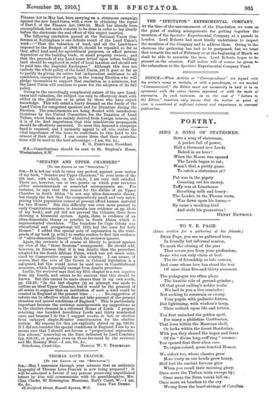"SENATES AND UPPER CHAMBERS."
ITO THE EDITOR OF THE "SPECTATOR."]
SIR,—It is not my wish to enter any protest against your review of my book, "Senates and Upper Chambers," in your issue of the 5th inst., with which, on the whole, I am very well satisfied. There are, however, one or two points on which your reviewer either misunderstands or somewhat misrepresents me. For instance, he says that the reason for the dislike of an Upper Chamber in South Africa "is not any ultra-democratic theory, but simply the fact that the comparatively small and very enter- prising white population cannot at present afford human material for two Houses." But this difficulty was even more present to early Constitution-makers in Australia (see evidence on pp. 40-45 of my book), and yet did not prevent the Colonies there from choosing a bicameral system. Again, there is evidence of an ultra-democratic theory or practice in South Africa which is unprecedented elsewhere. "The franchise for Cape Colony was educational and occupational till 1910, but the. same for both Houses." I added this special note of explanation in the corri- genda of my book (p. xviii.) to enable readers to find this evidence of "ultra-democratic theory" which the reviewer ignores.
Again, the reviewer is of course at liberty to protest against my view of the "three Sessions" arrangement. He should add, however, in fairness that it is less drastic than the procedure adopted for the South African Union, which was not much criti- cised by Conservative organs in this country. I am aware, of course, that the veto of the Crown in Colonial legislation is a safeguard, but this would never be used save in Constitutional measures, which I specially exempt from drastic procedure.
Lastly, the reviewer says that my fifth chapter is a non. sequitur from my fourth, and seems to be anxious that this should be known. But this cannot be made clearer than in my own words, pp. 152-53: "In the last chapter (4) an attempt was made to outline an idea/ Upper Chamber, but it would be the greatest of all errors to suppose that an institution of such a kind could be created in England at the present time No suggestion of reform can be effective which does not take account of the present situation and special conditions of England." This is particularly important because the reviewer misrepresents my suggestions as to the elective element in a reformed House of Lords. I propose retaining one hundred hereditary Lords and thirty nominated ones, and because I do this I suggest scrutin de lists or election from enlarged single-Member constituencies for the elective section. My reasons for this are explicitly stated on pp. 193-95. If I did not consider the special conditions in England, I am by no means sure that I should not favour a "proportional representa- tion scheme," somewhat on the lines indicated by Lord Courtney (pp. 318-19), or perhaps even on those favoured by the reviewer and Mr. Ramsay Muir.—I am, Sir, &c.,


















































 Previous page
Previous page